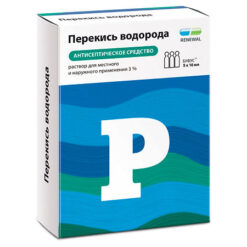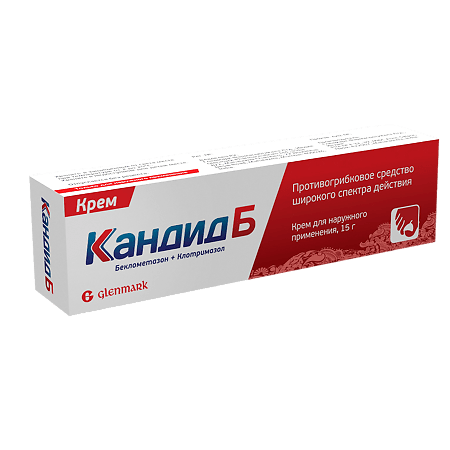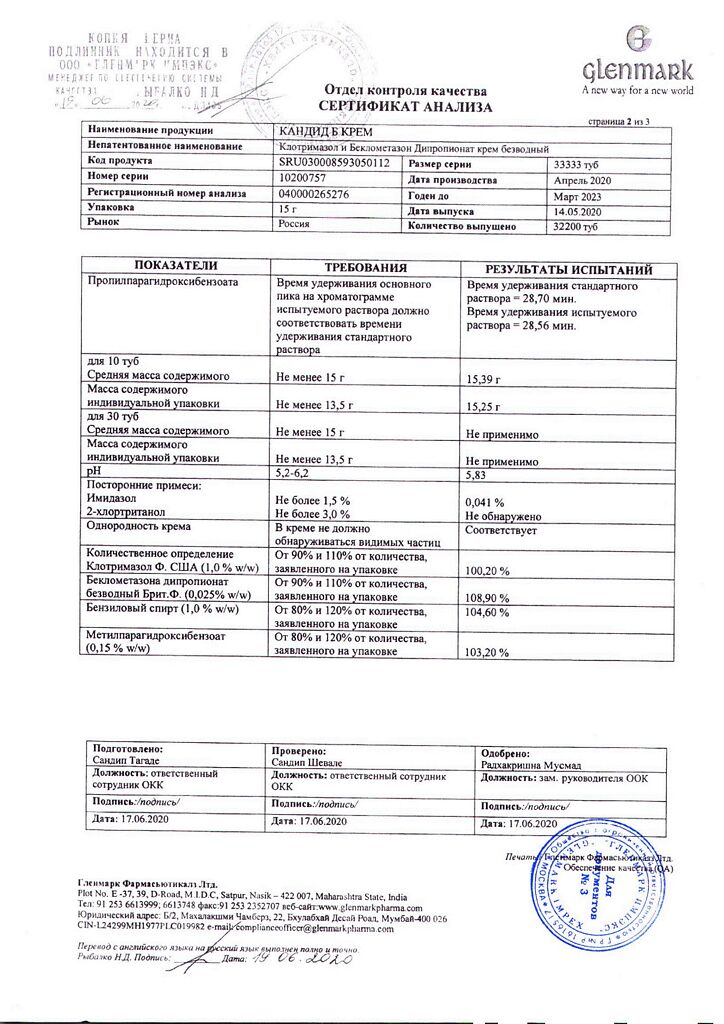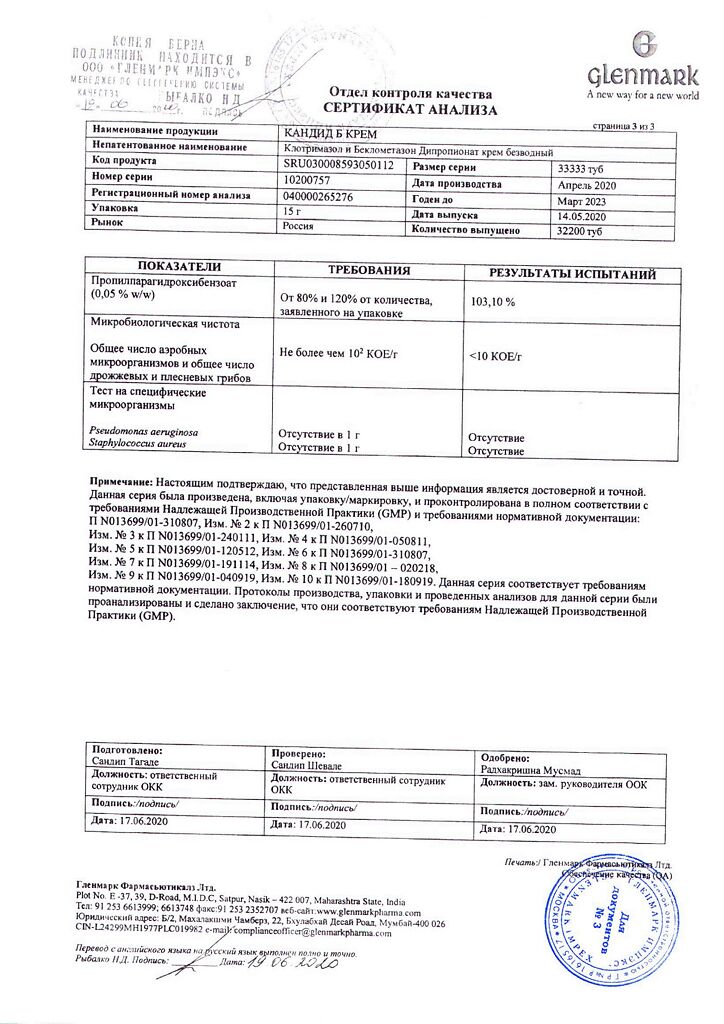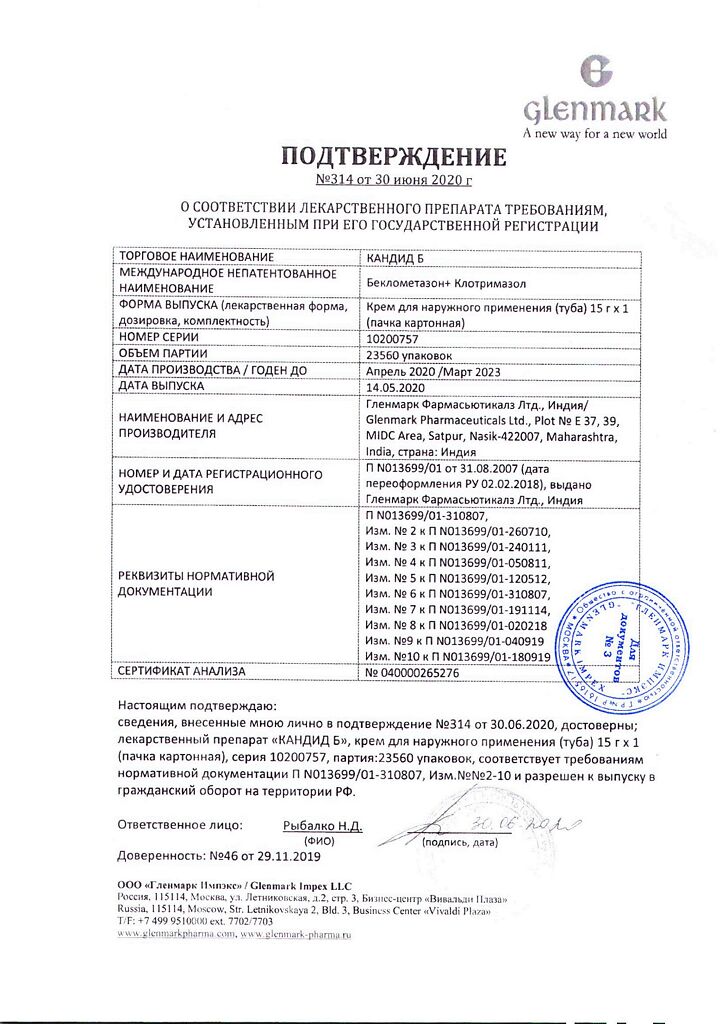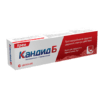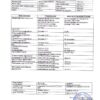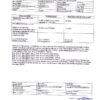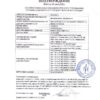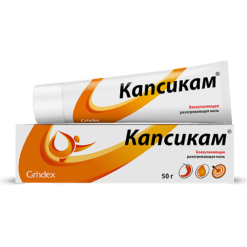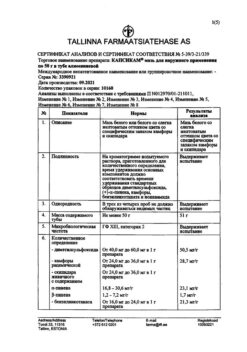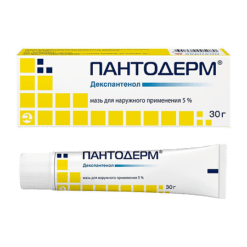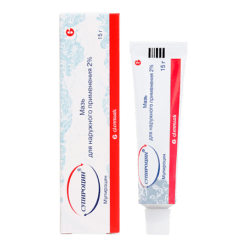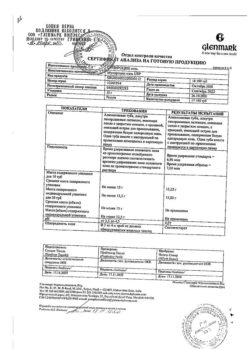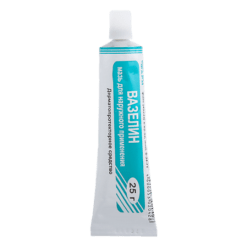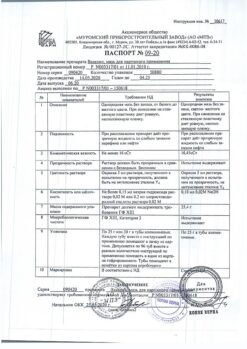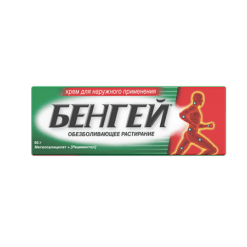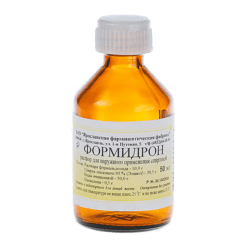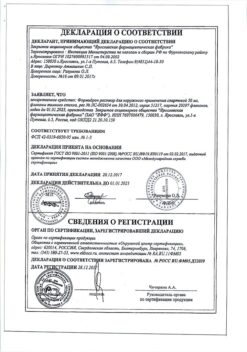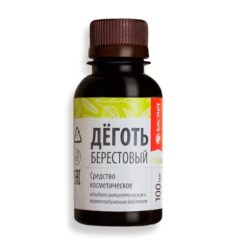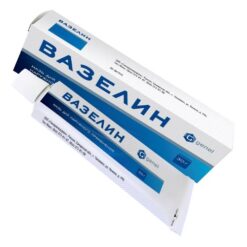Subtotal: €3.13
Candide B, cream 15 g
€20.93 €17.44
Candid-B – antifungal topical, anti-inflammatory topical, anti-exudative, antipruritic, anti-allergic.
Pharmacodynamics
Clotrimazole – imidazole derivative, antifungal agent of broad spectrum action.
The effect of the drug is associated with disruption of the synthesis of ergosterol, which is part of the cell membrane of fungi, which causes changes in its structure and properties and leads to cell lysis. Dermatophytes, yeasts (genus Candida, Torulopsis glabrata, Rhodotorula), molds, as well as Pityriasis versicolor (herpes simplex) and erythrazma are sensitive to clotrimazole.
In addition, it has antimicrobial action against Gram-positive (staphylococci and streptococci) and Gram-negative bacteria (Bacteroides, Gardnerella vaginalis) and against Trichomonas vaginalis.
Beclomethasone dipropionate has anti-inflammatory, anti-allergic, anti-exudative and antipruritic effects.
When used topically, beclomethasone dipropionate suppresses inflammatory and allergic skin reactions as well as those associated with increased proliferation, resulting in a reduction of objective symptoms (erythema, edema, lichenification) and subjective sensations (itching, irritation, pain).
Indications
Fungal infections of the skin caused by sensitive microorganisms (including ringworm, athlete’s foot, dermatosis complicated by secondary infection), especially against the background of eczematous lesions.
Pharmacological effect
Candid-B – local antifungal, local anti-inflammatory, antiexudative, antipruritic, antiallergic.
Pharmacodynamics
Clotrimazole is an imidazole derivative, a broad-spectrum antifungal agent.
The effect of the drug is associated with a disruption in the synthesis of ergosterol, which is part of the cell membrane of fungi, which causes a change in its structure and properties and leads to cell lysis. Dermatophytes, yeasts (genus Candida, Torulopsis glabrata, Rhodotorula), molds, as well as the pathogen Pityriasis versicolor (lichen versicolor) and the pathogen erythrasma are sensitive to clotrimazole.
In addition, it has an antimicrobial effect against gram-positive (staphylococci and streptococci) and gram-negative bacteria (Bacteroides, Gardnerella vaginalis), as well as against Trichomonas vaginalis.
Beclomethasone dipropionate has anti-inflammatory, antiallergic, antiexudative and antipruritic effects.
When applied externally, beclomethasone dipropionate suppresses inflammatory and allergic skin reactions as well as reactions associated with increased proliferation, which leads to a reduction in objective symptoms (erythema, swelling, lichenification) and subjective sensations (itching, irritation, pain).
Special instructions
If, upon first use of Candide B cream, a hypersensitivity reaction on the skin (itching, burning or redness) develops, you should immediately stop using the drug and consult a doctor.
Long-term therapy should be avoided whenever possible, especially in children, due to possible suppression of adrenal function.
Application to a large area or use of occlusive dressings may result in systemic absorption of beclomethasone.
Avoid contact of the drug with the eyes; Do not apply to the skin in the eye area and mucous membranes.
The development or spread of infection requires discontinuation of the drug and the appointment of antimicrobial therapy.
The bacterial infection is maintained in warm, moist conditions, including occlusive dressings, so the skin must be cleansed before applying the cream.
There is no data on the adverse effects of Candide B cream on the ability to drive vehicles and operate machinery.
Active ingredient
Beclomethasone, Clotrimazole
Composition
1 g of cream contains:
Active ingredients:
Clotrimazole 10 mg
Beclomethasone 250 mcg
Excipients:
White Vaseline jelly
Liquid paraffin
Cetomoacrogol wax
Benzyl alcohol
Methylparaben
Propylparaben
Butylated hydroxytoluene
Propylene glycol
Monosodium phosphate
Anhydrous sodium phosphate
Purified water.
Pregnancy
External use of Candida B cream in pregnant women is allowed in cases where the expected benefit to the mother outweighs the risk to the fetus.
In such cases, the use of the drug should be short-term and limited to small areas of the skin.
It is not known whether the drug passes into mother’s milk, therefore, during breastfeeding, the use of the drug Candide B is possible only under strict indications, and the drug should not be applied to the skin of the mammary gland before feeding.
Contraindications
Hypersensitivity, skin tuberculosis, chicken pox, measles, herpes, vaccination, syphilitic skin rashes.
With caution. Hypersensitivity, skin tuberculosis, chicken pox, herpes, vaccination, syphilitic skin rashes.
Side Effects
Side effects are usually mild.
Local allergic reactions are possible – redness of the skin, burning and tingling sensation at the site of application of the drug.
Rarely, as with the use of other corticosteroids, acne-like changes, hypopigmentation, stretch marks, skin atrophy, hypertrichosis, telangiectasia, and secondary skin infections may develop.
Overdose
Symptoms:
with long-term use of beclomethasone on large surfaces of the skin with impaired integrity or using an occlusive dressing, as well as with long-term use in children, the development of side effects associated with suppression and insufficiency of the function of the adrenal cortex is possible.
Treatment:
discontinuation of the drug and, if necessary, symptomatic therapy.
Storage conditions
In a place protected from light, at a temperature not exceeding 25 °C
Shelf life
3 years
Manufacturer
Glenmark Pharmaceuticals Ltd, India
| Shelf life | 3 years |
|---|---|
| Conditions of storage | In a light-protected place, at a temperature not exceeding 25 °C |
| Manufacturer | Glenmark Pharmaceuticals Ltd, India |
| Medication form | exterior cream |
| Brand | Glenmark Pharmaceuticals Ltd |
Related products
Buy Candide B, cream 15 g with delivery to USA, UK, Europe and over 120 other countries.

